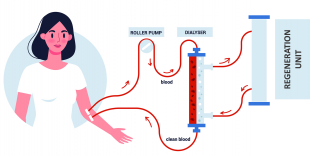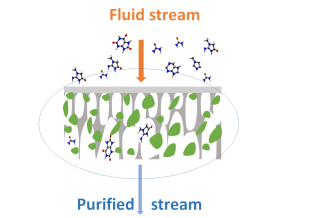This project is connected to the EPSRC Cross College Strategic Scholarships, HealthCare-CMVM Healthcare Strategic DTP Scholarships, College of Science of Engineering and Colle of Medical and Veterinary medicine (deadline Feb 28th 2023).
Hemodialysis (HD) is the life-saving treatment for millions of patients with end stage kidney disease, but it has several clinical and technological downsides. Its discontinuity causes poor life quality and health issues, and it is also extremely wasteful (about 500 liters of water per session).
The research group at the school of engineering has been looking at ways to transform the HD technology by fabricating novel materials which can enable the miniaturisation of HD and the regeneration of the water used. Such approach would simultaneously curb water consumption and achieve more accessible forms of treatment such as the wearable artificial kidney. Interaction with the group of dr. Laura Denby from Centre for Cardiovascular Science and with the renal unit at the Royal Infirmary will allow to test the materials in more realistic conditions and to assess their biocompatibility.
- At the SoE, the student will be trained on the synthesis and characterization of the materials and computational methods to evaluate the materials performance
The student will develop novel material formulations based on the result of computational modeling and previous results from the research group. - The materials will be tested at SoE for urea and uremic toxins removal capacity using synthetic aqueous solutions.
- The best materials selected will be tested in realistic conditions using real dialysate provided by partners
- The biocompatibility of the materials will be assessed in conjunction
The aim of the project is to fabricate a device able to remove the majority of uremic toxins from dialysate and develop a wearable artificial kidney.
At the School of Engineering, the student will access a lab fully equipped for the preparation of the materials and the test of their performance. Computational resources for the fast evaluation and screening of novel nanoporous materials and performance-structure correlations will also be made available.
The PhD project will be developed in the framework of projects led by the Supervisors and funded by Kidney Research UK (KRUK).
The candidate will attend the events organized by KRUK such as conferences and courses. The student will also attend conferences of the materials and dialysis sector *e.g. Euromembrane, ICOM etc.
Further Information:
The University of Edinburgh is committed to equality of opportunity for all its staff and students, and promotes a culture of inclusivity. Please see details here: https://www.ed.ac.uk/equality-diversity
Closing Date:
Principal Supervisor:
Assistant Supervisor:
Eligibility:
Minimum entry qualification - an Honours degree at 2:1 or above (or International equivalent) in a relevant science or engineering discipline, possibly supported by an MSc Degree.
Further information on English language requirements for EU/Overseas applicants.
Funding:
Applications are welcomed from self-funded students, or students who are applying for scholarships from the University of Edinburgh or elsewhere (subject to the obtainment of an EPSRC Cross College, HealthCare-CMVM Strategic DTP Scholarships)




